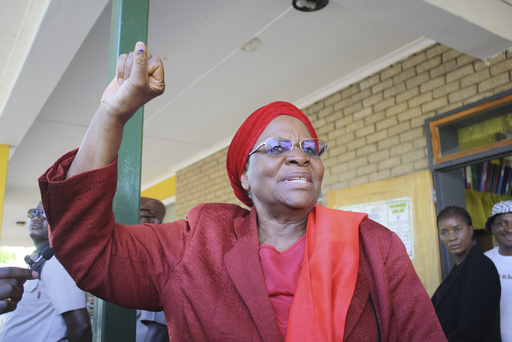
WINDHOEK, Namibia — The electoral authority in Namibia has decided to extend the voting period for the presidential and parliamentary elections into the weekend due to a shortage of ballot papers. This decision has sparked controversy, with the main opposition party, the Independent Patriots for Change, questioning the legality of the extension and alleging that it indicates potential electoral fraud.
The country’s elections management body announced that polling stations, which were originally scheduled to close on Wednesday, would now remain open until Saturday evening. The extension comes in light of several polling places running out of necessary materials. The opposition party claims this move is unlawful and undermines the electoral process.
Namibia’s electoral challenges are reminiscent of the unrest currently occurring in Mozambique, where violent protests erupted after the long-standing Frelimo party was declared victorious in the recent elections despite allegations of vote manipulation. This context of discontent adds weight to the opposition’s claims in Namibia.
Netumbo Nandi-Ndaitwah, who is the 72-year-old vice president and the candidate for the ruling SWAPO party, could make history by becoming the first female president if she secures victory. However, she faces significant challenges from a younger demographic that is increasingly disillusioned with the lack of job prospects in a nation rich in natural resources yet grappling with severe inequality.
According to Elsie Nghikembua, who leads the Electoral Commission of Namibia, many citizens have been unable to vote due to “logistical” issues. Observations showed that long queues continued at polling stations throughout the day on Friday, as several remote locations awaited crucial deliveries of ballot papers.
Electoral officials have reassured the public that ballots are on the way; however, many voters are skeptical about this promise. One voter, Nangombe Shitaleni, expressed his frustration outside the Okandjengedi Community Center polling station, stating he had tried to cast his vote since Wednesday without success. He mentioned that he would abandon his efforts if he was not able to vote by Friday evening.
Approximately 1.4 million Namibians, roughly half of the country’s total population, are registered to participate in choosing the next president and setting the configuration of parliament for the next five years. Namibia, a former German colony, experienced South African governance following World War I, and its Black majority faced apartheid-like conditions for a significant period. The SWAPO party, which played a crucial role in the nation’s fight for independence, has maintained political dominance since becoming independent in 1990.
Historically, Namibia’s elections have been regarded as credible, contributing to its reputation as one of the continent’s most stable democracies in a region often marked by tumultuous power transitions. SWAPO has held power for 34 years since independence, but rising dissatisfaction over joblessness and economic challenges has been particularly pronounced among the youth, mirroring trends seen in other southern African nations where voters have recently turned away from traditional ruling parties to seek fresh approaches to emerging issues.
